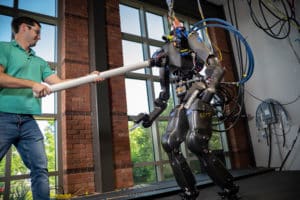IHMC receives grant to continue SquadBot research program
Published 8.8.22
The Florida Institute for Human and Machine Cognition robotics team lead by Dr. Robert Griffin secured a $3 million grant from the Office of Naval Research for SquadBot 2. The grant was approved in the summer of 2022.
The grant will allow the team to build upon the progress made on the first iteration of the SquadBot platform, named Nadia. A fully functional Nadia would be capable of working alongside and in place of soldiers in operations including building search, patrol, and bomb disposal.
“Nadia has the potential to shift the paradigm for urban operations and exploration, with the potential to save lives and reduce collateral damage,” Griffin says.
The SquadBot 2 project will work to improve the hardware platform, as well as enhance Nadia’s semi-autonomous behavior architecture to include persistence, particularly for entering structures and moving objects and obstacles. The work also will focus on developing advanced mobility algorithms focused on high-speed and multicontact locomotion, including approaches for bracing, crawling, and standing up after a fall.

Success will be measured by execution speed and reliability compared to humans. The goal is the design of a robot able to remove debris from its path, capable of multicontact locomotion, and a high power-to-weight ratio to support fast, dynamic motions.
he key innovations of this project will be:
- Improved survivability of falls.
- Multicontact controls for building exploration.
- Persistent behaviors for building exploration.
The goal of the project is to create a high-performance humanoid robot platform with the range of motion approaching that of a human.
“We want to advance both the capabilities of humanoid robots and their speed of operation,” Griffin says. “The goal is to achieve human-level speeds so that the robots can keep pace with the tempo of real-world action.”
IHMC is a not-for-profit research institute of the Florida University System where researchers pioneer science and technology aimed at leveraging and extending human capabilities. IHMC researchers and staff collaborate extensively with the government, industry and academia to help develop breakthrough technologies. IHMC research partners have included: DARPA, the National Science Foundation, NASA, Army, Navy, Air Force, National Institutes of Health, IBM, Microsoft, Honda, Boeing, Lockheed, and many others.
Latest News
- STEM-Talk: Ask Me Anything with Dr. Ken Ford
- David Bear joins IHMC Board of Directors
- STEM-Talk: Michael Schmidt on building a space-faring civilization
- Florida Blue award supports health and wellness research and outreach at IHMC
- STEM-Talk: Ken Forbus on AI and his development of the Structure Mapping Engine
- STEM-Talk: Pascal Lee on returning to the Moon — and heading to Mars
- Aging Symposium draws experts to IHMC
- IHMC hosts Fredric G. Levin Lung Care Symposium March 27-28 in Pensacola
- Humanoid robotics and exoskeletons lead latest IHMC newsletter

